Internet An Ideal Tool For Extremists - FBI
Published:
17 November 2001 y., Saturday
Modern information technology is facilitating new organizational models used by extremist groups, according to the FBI's National Infrastructure Protection Center (NIPC).
Technologies such as Internet relay chat (IRC), Web-based bulletin boards, and free e-mail accounts are enabling extremist groups to adopt a structure known as "leaderless resistance," according to an unclassified document published Nov. 10 by the NIPC.
"An extremist organization whose members get guidance from e-mails or by visiting a secure Web site can operate in a coordinated fashion without its members ever having to meet face to face," said the report, which was prepared by NIPC cyber-terrorism experts.
Extremist groups have adopted the leaderless resistance model in part to "limit damage from penetration by authorities" seeking information about impending attacks, the NIPC said.
Besides offering a medium for secure communications, Internet technologies also enable extremists to provide a "steady stream of propaganda" aimed at recruitment and indoctrination.
The report also said that electronic communication tools such as IRC and America Online's ICQ chat software enable widely dispersed members to share information "in support of a common (and sometimes violent) goal."
Šaltinis:
newsbytes.com
Copying, publishing, announcing any information from the News.lt portal without written permission of News.lt editorial office is prohibited.
The most popular articles
Software company announced new structure_ of it_s business.
more »
 Wincor Nixdorf AG has opened a global distribution center in Singapore to support its growing operations in Asia Pacific.
more »
Wincor Nixdorf AG has opened a global distribution center in Singapore to support its growing operations in Asia Pacific.
more »
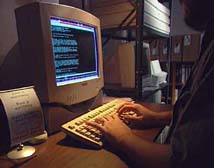 Over 3 million people in Europe bet online on sports like football, cricket and horse racing.
more »
Over 3 million people in Europe bet online on sports like football, cricket and horse racing.
more »
 Executives from Wincor Nixdorf Inc. (USA) hosted a bankers' forum last month, highlighting emerging trends in a challenging U.S. economic environment.
more »
Executives from Wincor Nixdorf Inc. (USA) hosted a bankers' forum last month, highlighting emerging trends in a challenging U.S. economic environment.
more »
 The appeal for a reverse ATM code has again popped up in mainstream press, this time in Illinois, where the (Peoria, Ill.) Journal Star last week reported about a technology that has been discussed in the industry for several years, yet fails to take off.
more »
The appeal for a reverse ATM code has again popped up in mainstream press, this time in Illinois, where the (Peoria, Ill.) Journal Star last week reported about a technology that has been discussed in the industry for several years, yet fails to take off.
more »
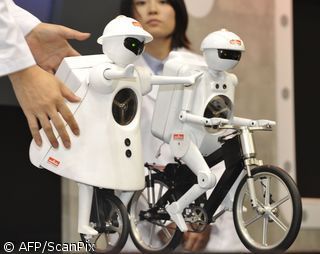 At the CeBIT fair grounds in Hanover, Germany, you move into a different realm. One with robots - lots of bots.
more »
At the CeBIT fair grounds in Hanover, Germany, you move into a different realm. One with robots - lots of bots.
more »
 During the 10th annual ATM Industry Association conference last month, ATMIA and ATM Marketplace recognized four leading ATM players for their individual or combined contributions to the ATM Industry.
more »
During the 10th annual ATM Industry Association conference last month, ATMIA and ATM Marketplace recognized four leading ATM players for their individual or combined contributions to the ATM Industry.
more »
 The show held annually in the northern German city of Hannover usually invites a foreign nation to become an official partner, but in a historic move that distinction was granted to the State of California this year.
more »
The show held annually in the northern German city of Hannover usually invites a foreign nation to become an official partner, but in a historic move that distinction was granted to the State of California this year.
more »
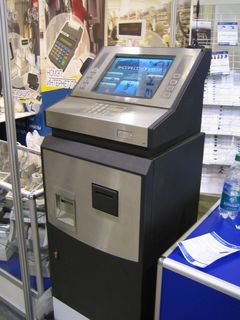 After a six-month research project that involved the surveying of some 1,600 ATM and financial executives from throughout the world, ATM Marketplace and the ATM Industry Association have announced plans to release the findings of their research next month.
more »
After a six-month research project that involved the surveying of some 1,600 ATM and financial executives from throughout the world, ATM Marketplace and the ATM Industry Association have announced plans to release the findings of their research next month.
more »
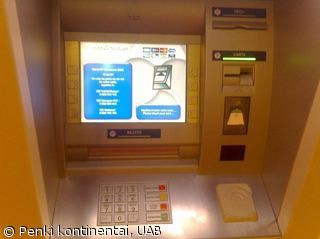 Technology Credit Union has teamed with LocatorSearch to introduce a global positioning system (GPS) download to help members find surcharge-free ATMs.
more »
Technology Credit Union has teamed with LocatorSearch to introduce a global positioning system (GPS) download to help members find surcharge-free ATMs.
more »
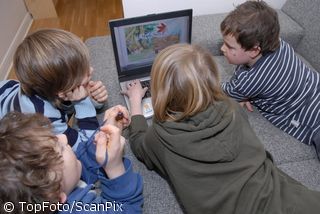 It's easy to demonise violent video games, but a report making its way through parliament says that "video games can have beneficial effects upon young people."
more »
It's easy to demonise violent video games, but a report making its way through parliament says that "video games can have beneficial effects upon young people."
more »